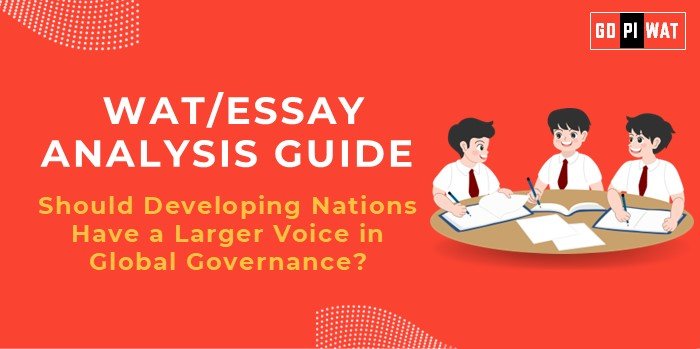📋 Group Discussion (GD) and Written Ability Test (WAT) Analysis Guide: Should Developing Nations Have a Larger Voice in Global Governance?
🌐 Understanding the Topic’s Importance
Developing nations’ growing economic and demographic relevance underscores the need for equitable representation in global governance. This topic aligns with themes of fairness, equity, and strategic leadership, crucial for B-school students aiming for roles in international organizations or policymaking.
🧠 Effective Planning and Writing
- 🕒 Time Allocation: Planning: 5 minutes, Writing: 20 minutes, Review: 5 minutes.
- 📚 Preparation Tips: Compile recent data on economic and political contributions of developing nations and examples of successful advocacy.
📜 Introduction Techniques for Essays
- 🔍 Contrast Approach: “Despite comprising 84% of the global population, developing nations hold less than 40% of IMF voting rights, exposing a stark imbalance in global governance structures.”
- 💡 Solution-Oriented Approach: “A larger voice for developing nations in global governance is not just equitable but essential for addressing shared challenges like climate change and inequality.”
🔍 Structuring the Essay Body
- 🏆 Achievements: Highlight successes like the African Union joining the G20 and BRICS expansion.
- 📉 Challenges with Comparative Analysis: Discuss barriers like underrepresentation in the UN versus inclusive models like ASEAN.
- 🔮 Future Outlook: Explore the role of regional cooperation and emerging economic blocs in reshaping governance.
✅ Concluding Effectively
- ⚖️ Balanced Conclusion: “Equitable representation for developing nations is key to making global governance both fair and effective, but achieving this requires pragmatic reforms.”
- 🔭 Forward-Looking Conclusion: “The future of global governance depends on empowering developing nations, whose leadership can drive solutions to shared global challenges.”
🌱 Recommendations for Sustainable Progress
- 📊 Advocate for regional representation models in international bodies.
- 📈 Increase developing nations’ IMF and World Bank voting shares to reflect current economic realities.
✍️ Sample Short Essays
📖 Balanced Perspective
“The inclusion of developing nations in global governance ensures both equity and the efficacy of decisions affecting the majority of the world’s population.”
🌍 Solution-Oriented
“Expanding representation for developing nations in institutions like the UN and IMF is critical for addressing global inequities and fostering inclusive growth.”
🌐 Global Comparison
“While the EU demonstrates successful regional representation in governance, similar models could empower developing nations, ensuring fairer and more effective global decision-making.”


